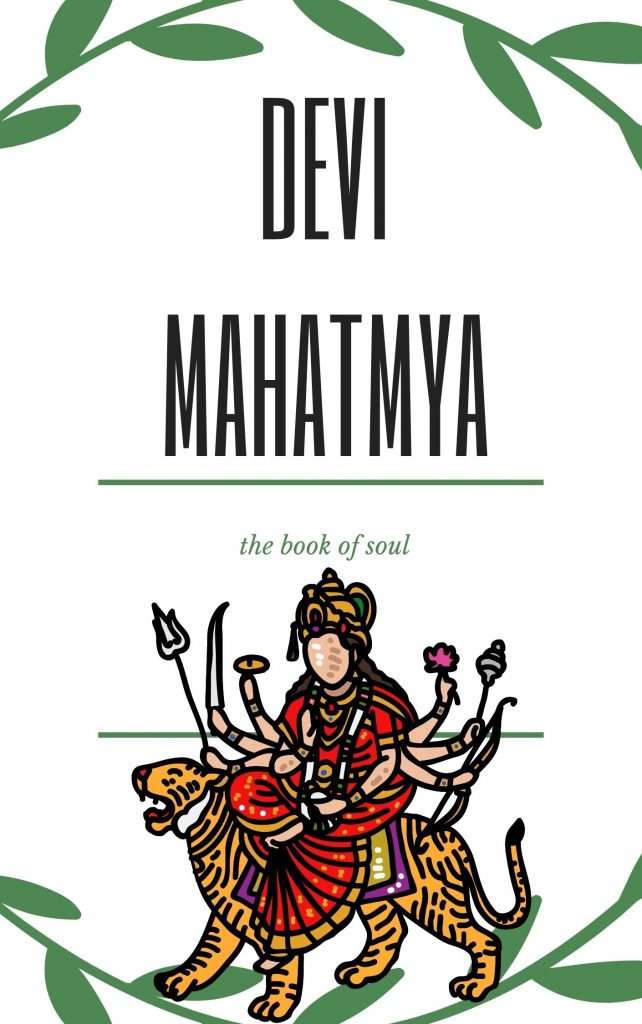“The “Devi Mahatmya” is thus “the Supreme Way to Well-Being.”
The Divine Mother is the force that drives everything in the universe. “Devi Mahatmya” defines the nature of the Divine Mother, The Unlimited Shakti (energy) behind all Limited Shaktis, The Moola Prakriti, the root nature, of all that manifests.
The Devīmāhātmya’s benefits apply to all areas of human existence and endeavor, promoting social harmony and justice, physical health and safety, and psychological and spiritual wholeness.
The Devī, The Divine Mother, has instructed that Her Māhātmya (Glory) is to be recited and heard with a collected mind (DM-12.2, 12.4, 12.7). Besides attentiveness, Devotion is paramount (DM-12.4, 12.7, 12.12). Full, unwavering attention is essential to all forms of sādhana, including ritual worship and meditation, and must be given likewise to singing The Divine Mother’s praises. The recitation of the text alone is as pleasing to The Devī as lavish offerings, ritual worship, and the observance of other religious duties (12.21–22). Recitation of The Devīmāhātmya Draws The Divine Presence to those places and renders them Holy (DM-12.9).
The recitation or hearing of the text “turns nightmares into sweet dreams” (12.17), relieves anxiety caused by the ill-boding of stars and other evil portents (12.16–17), and nullifies the influence of evil spirits (12.19, 12.23). In the societal sphere, wherever discord erupts within human relationships, recitation of the “Devi Mahatmya” provides reconciliation (12.18).
How the “Devi Mahatmya” protects from troubles and sufferings?
Because the “Devi Mahatmya” protects from “misfortunes arising from wrongdoing” (DM-12.5), the Divine Mother’s Power over the law of karma is a manifestation of Her grace. The text confirms that Her devotees “will be freed by My grace from all afflictions” (DM-12.13), among them poverty and separation from loved ones (DM-12.5).
The six dangers listed in verse 12.6 are of two kinds:
- those arising from human agency (enemies, robbers, kings, and weapons), and
- those arising from natural disasters (fire and flood).
These are two categories within the “three kinds of calamity,” which the Māhātmya is said to put to rest (DM-12.8). The three categories are defined as:
- Adhibhautika (stemming from the actions of others in the objective world external to oneself),
- Adhidaivika (concerning the Gods or Divine agency operating through material objects—the so-called “acts of God,” such as earthquakes, fires, and floods), and
- Adhyātmika (concerning oneself, such as physical illness, mental distress, and self-inflicted suffering).
This triad affects the physical and psychological well-being of human beings. In regards to the body, the recitation of the “Devi Mahatmya” wards off “misfortunes born of pestilence” (DM-12.8) and childhood seizures (DM-12.18), and “grants freedom from disease” (DM-12.23).
Additionally, recitation of the “Devi Mahatmya” protects against physical threats (DM-12.6, 12.26–30), including those from natural disasters, wild animals, warfare, crime, and societal injustice.
The “Devi Mahatmya” is considered as the ‘Embodiment of Divine Power – Living Mantra’
As the ‘Word’ (Vāk) as an actual manifestation of Śakti, the Divine Mother, the Śākta Tantra / Tradition correlates the Physical Universe with the Divine Reality from which the Physical Universe flows.
Accordingly, the words of the “Devi Mahatmya” are not merely poetry śloka, but The Actual Embodiment Of Divine Power (Mantra).
Accessing The Power of the “Devi Mahatmya”
Such is the Power of the “Devi Mahatmya”, that Śiva Himself is said to have Restrained “as if with a bolt”to prevent the intentional or unwitting misuse. When properly recited or heard, the “Devi Mahatmya” provides access to its Inherent Power. Even as the sacred verses draw the individualized consciousness toward the Universal Consciousness, The Devī’s Energy Proceeding through the Sacred Words Destroys every misfortune (DM-12.2) so that no evil will befall the Divine Mother’s devotees (DM-12.5). Formal recitation, performed according to elaborate and strictly defined ritual practices, involving physical and mental preparation (‘meditation’, affords access to that Power, which may be directed toward either temporal or spiritual ends.
The verses of the “Devi Māhātmya”, the ‘Living Mantras’, have the power to draw the reciter or hearer toward ‘Divinity’ (DM-12.20), to remove impurities (DM-12.23), and to produce an auspicious mind (DM-12.25).
The “Devi Mahatmya” is thus “the Supreme Way to Well-Being” (DM-12.7).


